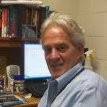Dan came to our (Zion Lutheran Church's) food give-away and free meal program last year. He taught me the term, "homeless survivor." Amazing how a small change in language can catch your attention and shift your thinking. At once I knew it was a better way to speak of people I have come to know. "Homeless" is a condition, not an identity. "Survivor" lends the dignity of personhood and achievement to those who are in that condition, AND to those who have been in it and survived. It also speaks to the long-term effects of surviving without the shelter of a stable home. Dan was kind enough to share some of his story as a homeless survivor.
Most unforgettable was that Dan looked me in the eye: "It could happen to you." I could feel that with every bit of power he had, he wanted me to understand this.
Dan is a few years older than me, in his sixties, well educated, well spoken, sober, and traumatized. He came for food.
A few years previously, Dan had what would seem to just about anyone a fine life. He had a wife and two grown children. He worked for a large corporation in I.T. and made a six-figure income. They owned a nice house and lived in a small town just outside the Twin Cities.

from Dan's LinkedIn page
He'd had stable employment his whole adult life, most recently over a decade with US Bank. A dispute with H.R. over a proposed change to the terms of his employment led to a three month severance package.
Dan was disappointed but not especially worried. He'd find something else and things would be ok. He pulled his resume together and began a professional job search.
Dan gradually discovered he was not marketable as a professional anymore. He was in his middle fifties. He had a computer programming degree from the 1970's. There was a question mark over his most recent employment.
In time his marriage unraveled. Dan decided his wife should have the house, and in a perhaps overly generous gesture, he used his money to pay off bills and the mortgage.
Yet he was still confident he could find some kind of job to make ends meet for himself. But he could not. He was too old and too old-school for the employment he was used to, and over-qualified for lesser roles. The odd jobs he took could not cover rent, car and living expenses. He had moved in with a friend. He felt increasingly uneasy about receiving his friend's hospitality. He left to live in his car; still working for small wages, still putting his resume out there.
The car was not a good home. And then it too was gone. It took a while for Dan to realize admit that he, in fact, was homeless.
Dan eventually (years later) found his way into a program through Catholic Charities where he is afforded a small apartment. It's a single room in the same complex as the "Wet House," a shelter that does not require sobriety. He does not like being there. There is no kitchen, just a dorm-room size fridge, hot plate and microwave.
He wants very much to be self-sufficient again. He tells me he's lost everything: career, family, house, home, health, and...most of all, his dignity. A market rate one bedroom apartment is beyond his reach. He refuses to become a permanent client of public housing. His eyes well up as he speaks.
"It could happen to you."
Dan taught me to look differently, and more closely. To identify, rather than dis-identify. To ask and begin to learn from the several other homeless survivors that grace our food give-away and free meal on Thursdays. To think of the growing "problem" of homelessness among us evidenced by "tents everywhere," not as an "issue," but as human beings. Being homeless is a condition. A condition belonging to all of us. Nearly half all those in MN currently surviving homelessness are children and youth 17 and under. 35% accompanied by an adult, and 16% on their own. Ask a teacher in our poorest schools.
It really could happen to anyone. To any of us. This, I believe, is where to start.
Disclaimer: Homeless survivors tend to be extraordinarily private people. The extent to which I share their stories, I am careful to not reveal their identities. In Dan's case I use his real name because he has already told his story publicly in a documentary called "Guttered," filmed by his friend (and mine, through Dan) Jerry Sedgwick.
I highly recommend watching "Guttered." Available on YouTube.

